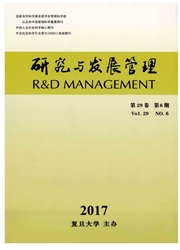

 中文摘要:
中文摘要:
本文以企业规模、研发投入和网络成员集聚程度作为控制变量,构建了网络非重复性、企业学习能力和技术创新三者之间关系的理论模型,并以申报广东省高新技术企业和民营科技型企业的458家企业为调查对象进行了实证检验.研究结果发现:网络非重复性对企业技术创新存在显著的负向影响,但这种负向影响并没有在高集聚环境的企业中出现;学习能力对技术创新存在显著的正向影响;企业学习能力在网络非重复度和技术创新之间起完全中介作用,但在低集聚环境的企业中只起不完全中介作用;在小规模企业中,这三者之间并不存在相互影响的关系.本研究进一步深化了前人的研究结论,对组织网络及技术创新的相关研究都有学术贡献.
 英文摘要:
英文摘要:
Taking the firm size, R&D input and clustering degree as control variables, it builds the theoretical model of the relationship among network non-recurring, study ability and technological innovation performance, and by taking high-tech and private-tech enterprises in Guangdong province as samples, it makes an empirical study on the model. The results show that network non-recurring plays a negative effect on the technological innovation performance signifi- cantly, while it is disappeared when referring to firm with a high clustering degree; study ability plays a significant positive impact on technological innovation performance; study ability plays a full mediate role between network non-recur- ring and technological innovation performance, which plays an incomplete mediate role when referring to firms with a low clustering degree; in small-size firms, the relationships among these variables disappear. It further deepens the conclusions of previous ones, and contributes to network of organizations and technological innovation.
 同期刊论文项目
同期刊论文项目
 同项目期刊论文
同项目期刊论文
 期刊信息
期刊信息
